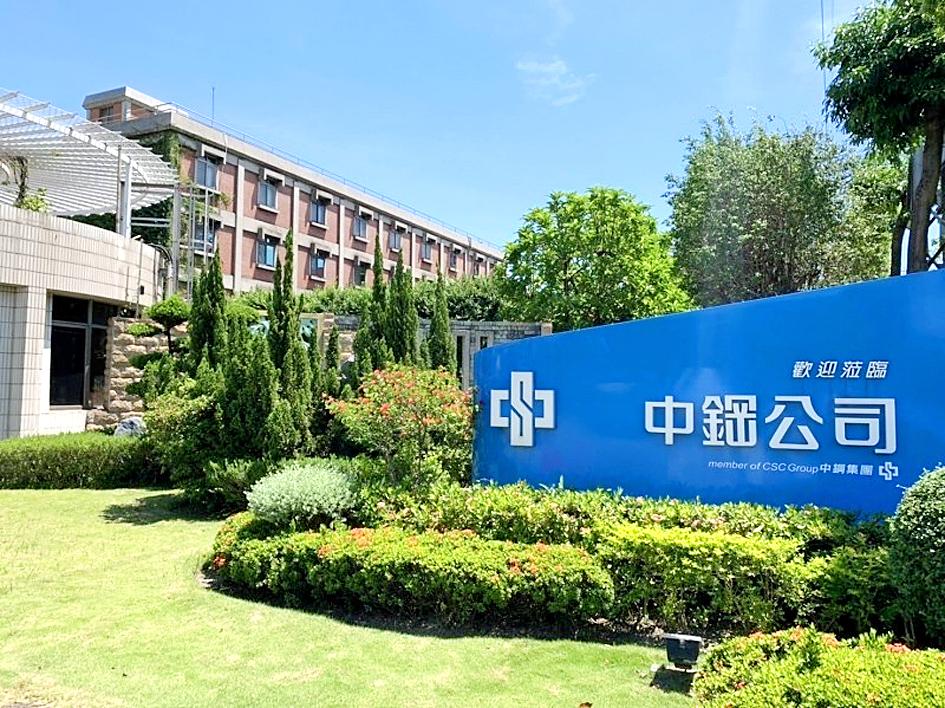China Steel Corp (CSC, 中鋼) posted NT$7.63 billion (US$274.36 million) in profit before tax for last month, a 24 percent month-on-month increase, thanks to strong demand worldwide as global economies reopen.
In May last year, the steelmaker lost NT$3.60 billion before tax.
The reversal is tied to global demand for steel, CSC executive vice president Hwang Chien-chih (黃建智) said.

Photo: Lin Jin-hua, Taipei Times
“Last May, we were still bearing the full brunt of the COVID-19 crisis worldwide, but now as China and the US are going full steam ahead on stimulus, and economic entities open up all over the world, we are seeing a massive bull market for steel,” Hwang said.
CSC was in the doldrums even before the pandemic, suffering 10 consecutive months of losses before profits turned positive in August last year.
Since then, the company has seen consistent increases in price and demand, and it is becoming more difficult to keep up with orders.
Due to its policy of “gentle price movements” and “consideration for the Taiwanese steel industry,” CSC’s prices are anywhere from “a few tens to a few hundreds” of US dollars per tonne lower than international prices, Hwang said.
“Our downstream customers lost money when we were losing money, and now they are making money with CSC,” he said. “If they have an existing quota with us, we will meet and even try to expand that quota, but we cannot satisfy every Taiwanese buyer.”
After 12 consecutive months of increasing prices for domestic steel delivery, CSC did not raise prices for monthly priced steel products this month even as international prices spiked, although it still substantially boosted them for seasonally priced products.
“We have to strike a balance between not becoming too far detached from international market prices and smoothing price movements for our customers,” Hwang said. “Eventually, prices will have to rise to international standards, but we heard from our customers that with everything else going up at the same time, they need some time.”
Demand for CSC’s products is likely to continue to grow, not just for the next few quarters, but the next few years, he said.
However, the Taiwanese steel industry and CSC itself face a challenge in increasing environmental, social and governance standards internationally for steel products.
“It’s coming. We advise our customers to start working out the carbon footprint of their products as soon as possible, because the EU is going to have tariffs on steel products depending on the amount of carbon dioxide released,” Hwang said.
CSC is trying to upgrade to higher-value-added products to lessen the toll of carbon tariffs, he said.
“In the long term, everybody is trying to figure out less carbon-intensive ways of making steel, but solutions are decades away and the technology, such as hydrogen, is still immature,” he said.

SEMICONDUCTORS: The German laser and plasma generator company will expand its local services as its specialized offerings support Taiwan’s semiconductor industries Trumpf SE + Co KG, a global leader in supplying laser technology and plasma generators used in chip production, is expanding its investments in Taiwan in an effort to deeply integrate into the global semiconductor supply chain in the pursuit of growth. The company, headquartered in Ditzingen, Germany, has invested significantly in a newly inaugurated regional technical center for plasma generators in Taoyuan, its latest expansion in Taiwan after being engaged in various industries for more than 25 years. The center, the first of its kind Trumpf built outside Germany, aims to serve customers from Taiwan, Japan, Southeast Asia and South Korea,

Gasoline and diesel prices at domestic fuel stations are to fall NT$0.2 per liter this week, down for a second consecutive week, CPC Corp, Taiwan (台灣中油) and Formosa Petrochemical Corp (台塑石化) announced yesterday. Effective today, gasoline prices at CPC and Formosa stations are to drop to NT$26.4, NT$27.9 and NT$29.9 per liter for 92, 95 and 98-octane unleaded gasoline respectively, the companies said in separate statements. The price of premium diesel is to fall to NT$24.8 per liter at CPC stations and NT$24.6 at Formosa pumps, they said. The price adjustments came even as international crude oil prices rose last week, as traders

POWERING UP: PSUs for AI servers made up about 50% of Delta’s total server PSU revenue during the first three quarters of last year, the company said Power supply and electronic components maker Delta Electronics Inc (台達電) reported record-high revenue of NT$161.61 billion (US$5.11 billion) for last quarter and said it remains positive about this quarter. Last quarter’s figure was up 7.6 percent from the previous quarter and 41.51 percent higher than a year earlier, and largely in line with Yuanta Securities Investment Consulting Co’s (元大投顧) forecast of NT$160 billion. Delta’s annual revenue last year rose 31.76 percent year-on-year to NT$554.89 billion, also a record high for the company. Its strong performance reflected continued demand for high-performance power solutions and advanced liquid-cooling products used in artificial intelligence (AI) data centers,

SIZE MATTERS: TSMC started phasing out 8-inch wafer production last year, while Samsung is more aggressively retiring 8-inch capacity, TrendForce said Chipmakers are expected to raise prices of 8-inch wafers by up to 20 percent this year on concern over supply constraints as major contract chipmakers Taiwan Semiconductor Manufacturing Co (TSMC, 台積電) and Samsung Electronics Co gradually retire less advanced wafer capacity, TrendForce Corp (集邦科技) said yesterday. It is the first significant across-the-board price hike since a global semiconductor correction in 2023, the Taipei-based market researcher said in a report. Global 8-inch wafer capacity slid 0.3 percent year-on-year last year, although 8-inch wafer prices still hovered at relatively stable levels throughout the year, TrendForce said. The downward trend is expected to continue this year,